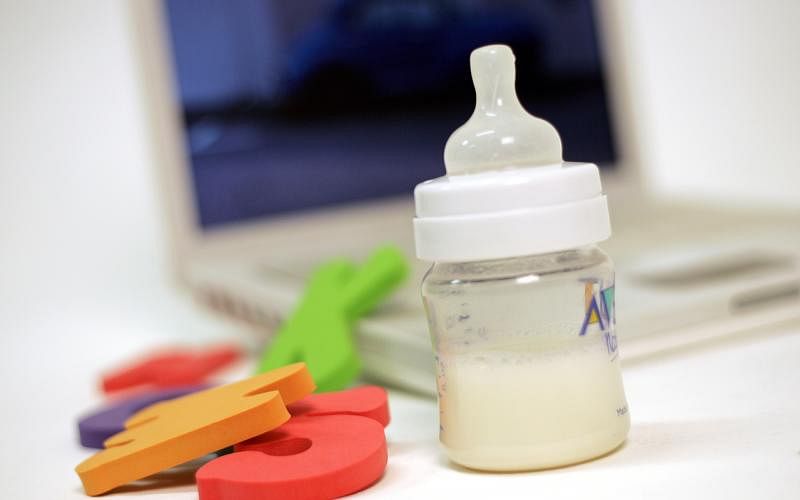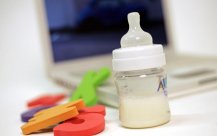
(Morning Post) A report published by the World Health Organization (WHO) and the United Nations Children's Foundation (UNICEF) on Wednesday (February 23) revealed the non -moral marketing strategies of the formula milk industry, and the systemic affects parents to choose the formulaMilk instead of breastfeeding baby decisions.
WHO and UNICEF call for formal milk marketing methods to terminate exploitation.
How does this formula for formulating milk marketing affect our baby feeding decision report? Interview surveys from parents, pregnant women and health workers from eight countries. More than half of parents and pregnant women saidFormulating milk company's marketing goals, many of them violate international standards.
WHO said that the formula milk and tobacco industry are only two products that have formulated international standards for marketing.Nevertheless, only 25 countries have completely implemented the international standards of formula milk into legislation.
The recipe milk industry is worth $ 55 billion (about S $ 74 billion) per year.The report found that the marketing methods of the formula milk industry include: unmissable and invasive online goals; sponsoring consulting networks and helping hotlines; promotions and free gifts; and practices that affect health workers' training and suggestions.
The information obtained by parents and health workers is often misleading, lacks scientific basis, and contrary to the conservation rules of international breast milk substitutes.The latter is a milestone public health agreement passed by the 1981 World Health Conference to protect the influence of the mother's aggressive marketing practices from the infant food industry.
This report investigated Bangladesh, China, Mexico, Morocco, Nigeria, South Africa, Britain and Vietnam cities, as well as 300 health workers in some cities in cities.The report shows that among all women who have been surveyed in the UK, the proportion of contact formula is 84%in contact with the marketing of recipes; this ratio among women surveyed in Vietnam and China is 92%and 97%, respectively, which increases their choice of formula milk feeding.possibility.
Among all countries covering the investigation, women expressed their strong hopes to take pure breastfeeding, from 49%of Morocco to 98%of Bangladesh.However, the report details the continuous misleading marketing information on how to strengthen the misunderstanding of breastfeeding and breast milk, and weaken women's confidence in successful breastfeeding.These misunderstandings include: Formula milk must be used in the first few days after the baby is born; the nutrition of breast milk to the baby is insufficient; it has proven that specific infant formula milk components can promote children's development or improve immunity; it is believed that formula milk can keep the baby more maintenance moreLong -term satiety; and the quality of breast milk will decrease over time.
Breastfeeding began within the first hour after birth, and then six months of pure breastfeeding, and continuous breastfeeding for up to two years or longer.The powerful line of defense of obesity).
Breastfeeding is also the first vaccine of infants to protect them from the influence of many children's common diseases.It also reduces the risk of women's future diabetes, obesity and certain cancers.However, only 44%of babies under the world are fully breastfeeding.In the past 20 years, the global breastfeeding rate has increased slightly, and the sales of formula milk have doubled in the same time.
It is shocking that the baby feeding industry has exposed a large number of health workers in all countries to affect the promotional gifts, free samples, research funds, paid meetings, activities and meetings, and even sales commission to affect their new mothers proposed to new mothers to the new mothers.It is recommended that it directly affects the feeding options of parents.More than one -third of the investigation women said that health workers have recommended a formula for a specific brand to them.
In order to cope with these challenges, WHO, the United Nations Children's Foundation and partners call on governments, health workers and infant food industries to terminate the exploitation formulation milk marketing, and fully implement and abide by the requirements of international breast milk substitution conservation requirements.Essence
This includes: according to the international rules, through monitoring and enforcement of laws to prevent sales of formula milk, such as prohibiting the formula milk industry from proposing nutrition and health statements; policies and plans for breastfeeding, including in accordance with international standardsProvide sufficient paid parenting leave and ensure that high -quality breastfeeding support is provided; the industry is required to openly promise to fully abide by the rules and the World Health Conference decision after the global scope;Scholarships, awards, gifts, conferences or activities.




